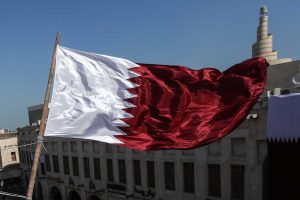Qatar unlikely to establish ties with Israel unless the Palestinian conflict is resolved, minister says

- Qatar is unlikely to normalize relations with Israel unless the conflict with the Palestinians has been resolved, according to Foreign Minister Mohammad bin Abdulrahman Al Thani.
- His comments come weeks after Israel and Hamas reached a cease-fire agreement following 11 days of fighting.
- Al Thani also discussed relations with the Gulf Cooperation Council countries and U.S.-Iran negotiations.
Qatar is unlikely to normalize relations with Israel unless the conflict with the Palestinians has been resolved, according to Foreign Minister Mohammad bin Abdulrahman Al Thani.
A raft of agreements were signed last year, with the United Arab Emirates, Bahrain, Morocco and Sudan establishing diplomatic ties with Israel in U.S.-brokered deals.
But countries such as Qatar and Saudi Arabia maintained that Israel must first sign a peace agreement with the Palestinians.
The main reason Qatar doesn't have relations with Israel "is the occupation of the Palestine territories," said Al Thani.
"The reason is still there, still valid, and there is no … step or any hope toward peace yet. We didn't see any light at the end of the tunnel," he told CNBC's Hadley Gamble at the St. Petersburg International Economic Forum on Friday.
Establishing relations with Israel won't solve the long-standing problems between Israel and the Palestinians, added Al Thani, who is also deputy prime minister of Qatar.
"I believe we should address the conflict first … then we take the step to have the peace with Israel," he said.
His comments come weeks after Israel and Hamas reached a cease-fire agreement following 11 days of fighting.
Reuters, citing state news agency QNA, reported on May 23 that Qatar Emir Sheikh Tamim bin Hamad al-Thani said the country will try to stop Israeli "aggression" against Palestinians.
Mediator in region?
Foreign Minister Al Thani also said Qatar is willing to facilitate talks between the U.S. and Iran.
Tehran has been negotiating a return to the 2015 Joint Comprehensive Plan of Action with the U.S. and other world powers in Vienna since April, but it remains unclear when talks could conclude.
"(The) U.S. is a strategic ally for Qatar, and we want to maintain this strategic alliance," he said. On the other hand, Iran is "our next-door neighbor, and we want to see stability over there."
He said Qatar would be willing to facilitate discussions if asked to.
"Right now, we are just conveying the message for both parties to … be more positive and more constructive in engaging with each other, and to reach a deal as soon as possible," he said.
After all, stopping the nuclear race in the Middle East is in the interest of Qatar and other Gulf Cooperation Council (GCC) countries, the minister said.
Within the region, Qatar sees a need for a regional security framework between Iran, which has a Shia Muslim majority, and the mainly Sunni Muslim GCC, Al Thani added.
"We believe it's important that we have the leadership of such a dialogue and not leave it for other countries," he said. "We appreciate and respect (the five permanent members of the UN security council) to be part of this, to be (a) supporter for this, but the core of this dialogue should be handled by the GCC and Iran."
An article published by the Atlantic Council said Qatar is trying to reposition itself as a "key regional mediator" since the GCC blockade was lifted in January, but that Doha's public mediation offers may entrench "mistrust within a still to be revived GCC."
Al Thani admitted that the 2017 diplomatic, trade and travel blockade on Qatar "fractured" the GCC for a while.
"What happened has … created a scar in the GCC, it needs some time to heal," he said.
Still, he struck a positive tone about the future of the economic alliance.
"There is a new page in the GCC, we are optimistic about it," he said, adding that other GCC countries also seek better cooperation in future.
Source: Read Full Article
